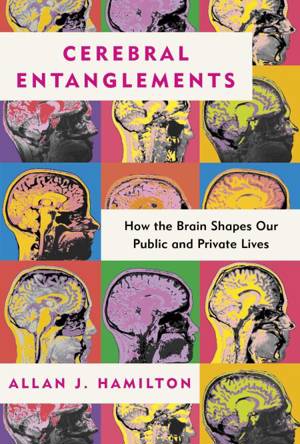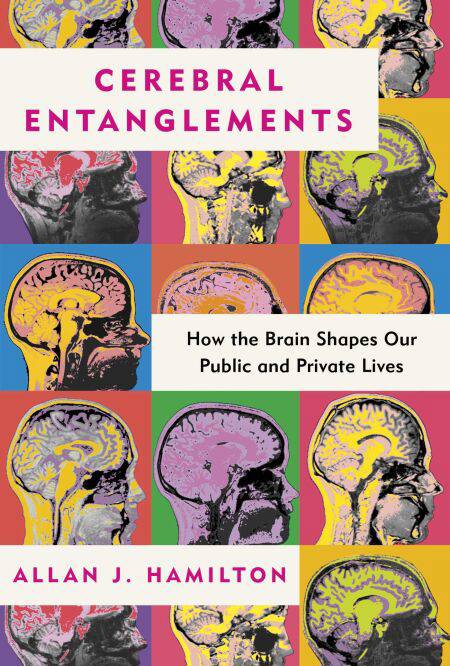
Bedankt voor het vertrouwen het afgelopen jaar! Om jou te bedanken bieden we GRATIS verzending (in België) aan op alles gedurende de hele maand januari.
- Afhalen na 1 uur in een winkel met voorraad
- In januari gratis thuislevering in België
- Ruim aanbod met 7 miljoen producten
Bedankt voor het vertrouwen het afgelopen jaar! Om jou te bedanken bieden we GRATIS verzending (in België) aan op alles gedurende de hele maand januari.
- Afhalen na 1 uur in een winkel met voorraad
- In januari gratis thuislevering in België
- Ruim aanbod met 7 miljoen producten
Zoeken
Cerebral Entanglements E-BOOK
How the Brain Shapes Our Public and Private Lives
Allan J. Hamilton
E-book | Engels
€ 16,76
+ 16 punten
Uitvoering
Omschrijving
A profound and profoundly important book that, using the most up-to-date revolutionary discoveries in neuroscience, shows us how to understand the brain; how it allows us to think, feel, experience and perceive, written by an acclaimed Harvard-trained neurosurgeon.
It took a brain surgeon who’s spent a lifetime in the operating room experiencing the brain's union of form and function to write this book. Cerebral Entanglements, unlike most books on the brain, looks at the intimate and vital emotions in our lives, and shows as well, how neuroimaging studies can transform our understanding of crucial emotional or mental health concerns.
Why do we love? Why do we hate? Why do we kill? Why do we laugh? Why do we have faith? Why does time stand still or speed up?
Focusing on the nature of consciousness, affection, trust, romance, empathy, kindness; prejudice, sadness, happiness, depression, grief, and the nature of laughter, the author shows us how neuroscience has changed our understanding of these emotions as he explores the extraordinary revelations that have emerged from brain imaging and functional studies. We see that we are the first generation to perceive the contours of a human thought, track the course of an emotion, even watch memory come together.
Allan Hamilton writes clearly and accessibly, about the complex science driving our emotions and experiences, and shows how our newfound knowledge can impact our well-being, individually and as a society. As the book explores the nature of happiness, laughter, stress, PTSD. Hamilton writes about how the brain perceives and experiences music, memory, and time itself.
It took a brain surgeon who’s spent a lifetime in the operating room experiencing the brain's union of form and function to write this book. Cerebral Entanglements, unlike most books on the brain, looks at the intimate and vital emotions in our lives, and shows as well, how neuroimaging studies can transform our understanding of crucial emotional or mental health concerns.
Why do we love? Why do we hate? Why do we kill? Why do we laugh? Why do we have faith? Why does time stand still or speed up?
Focusing on the nature of consciousness, affection, trust, romance, empathy, kindness; prejudice, sadness, happiness, depression, grief, and the nature of laughter, the author shows us how neuroscience has changed our understanding of these emotions as he explores the extraordinary revelations that have emerged from brain imaging and functional studies. We see that we are the first generation to perceive the contours of a human thought, track the course of an emotion, even watch memory come together.
Allan Hamilton writes clearly and accessibly, about the complex science driving our emotions and experiences, and shows how our newfound knowledge can impact our well-being, individually and as a society. As the book explores the nature of happiness, laughter, stress, PTSD. Hamilton writes about how the brain perceives and experiences music, memory, and time itself.
Specificaties
Betrokkenen
- Auteur(s):
- Uitgeverij:
Inhoud
- Aantal bladzijden:
- 368
- Taal:
- Engels
Eigenschappen
- Productcode (EAN):
- 9798888459492
- Verschijningsdatum:
- 10/02/2025
- Uitvoering:
- E-book
- Beveiligd met:
- Adobe DRM
- Formaat:
- ePub

Alleen bij Standaard Boekhandel
+ 16 punten op je klantenkaart van Standaard Boekhandel
Beoordelingen
We publiceren alleen reviews die voldoen aan de voorwaarden voor reviews. Bekijk onze voorwaarden voor reviews.









